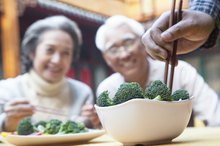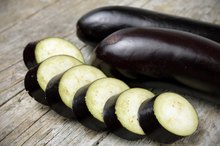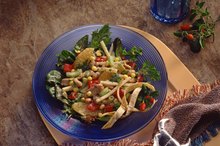What does fact checked mean?
At Healthfully, we strive to deliver objective content that is accurate and up-to-date. Our team periodically reviews articles in order to ensure content quality. The sources cited below consist of evidence from peer-reviewed journals, prominent medical organizations, academic associations, and government data.
- U.S. Food and Drug Administration: How to Understand and Use the Nutrition Facts Label
- Linus Pauling Institute at OregonState University: Micronutrient Information Center: Vitamin K
The information contained on this site is for informational purposes only, and should not be used as a substitute for the advice of a professional health care provider. Please check with the appropriate physician regarding health questions and concerns. Although we strive to deliver accurate and up-to-date information, no guarantee to that effect is made.
How Much Vitamin K Does Eggplant Contain?
Eggplant, a dark purple nightshade vegetable related to tomatoes, peppers and potatoes, is low in fat-soluble vitamin K, which contributes to blood clotting and helps you maintain healthy bones. If you are on blood-thinning medication it is important that you monitor your vitamin K intake, as it may interfere with how well your medication works. While eggplant is low, vegetables such as lettuce, broccoli, kale, spinach and other dark green vegetables are high in vitamin K.
Nutritional Content of Eggplant
One cup of cooked eggplant contains 3 micrograms of vitamin K, according to the U.S. Department of Agriculture, or USDA. This amount represents four percent of the daily value, or DV, for vitamin K -- the amount that a healthy person following a 2,000-calorie diet should have each day. According to the U.S. Food and Drug Administration, a food that has 5 percent or less of a nutrient is low in that nutrient 4. Raw eggplant has 2.9 micrograms in a 1-cup serving, and the same serving size of pickled eggplant has 5 micrograms of vitamin K. Eggplant is a low-calorie source of folate, potassium, phosphorous and fiber, according to the University of Illinois, which makes this vegetable a healthy addition to your diet despite its low vitamin K content 6.
- One cup of cooked eggplant contains 3 micrograms of vitamin K, according to the U.S. Department of Agriculture, or USDA.
- According to the U.S. Food and Drug Administration, a food that has 5 percent or less of a nutrient is low in that nutrient 4.
Intake Recommendations
Why Is Taking Coumadin & Cranberry Juice or Tablets Harmful Together?
Learn More
The adequate intake for vitamin K, or the amount you need each day, is 90 micrograms for women over 18 and 120 micrograms for men over 18, as set by the Institute of Medicine 8. According to the Linus Pauling Institute, people taking blood thinners may be able to consume up to the adequate intake level for vitamin K without experiencing a delay in their blood clotting time. If you consume approximately the same amount of vitamin K in the foods you eat each day, you should be able to keep your clotting time within the recommended range, according to the Linus Pauling Institute. Follow your health-care provider’s guidelines about the amount of dietary vitamin K you should have each day.
- The adequate intake for vitamin K, or the amount you need each day, is 90 micrograms for women over 18 and 120 micrograms for men over 18, as set by the Institute of Medicine 8.
- If you consume approximately the same amount of vitamin K in the foods you eat each day, you should be able to keep your clotting time within the recommended range, according to the Linus Pauling Institute.
Importance of Vitamin K
Vitamin K participates in a series of chemical reactions that allows your blood to clot. This vitamin also enables calcium to bind to bone. Getting enough vitamin K in your diet prevents abnormal bruising and bleeding, helps maintain your bone density and may reduce your risk of osteoporosis. However, because vitamin K promotes blood clotting, you may need to limit your intake of foods that contain this nutrient if you are taking warfarin or other blood-thinning medications. Eating eggplant and other foods that are low in vitamin K should not interfere with the actions of blood thinners.
- Vitamin K participates in a series of chemical reactions that allows your blood to clot.
- However, because vitamin K promotes blood clotting, you may need to limit your intake of foods that contain this nutrient if you are taking warfarin or other blood-thinning medications.
Alternatives to Eggplant
The Coumadin Diet
Learn More
If you are trying to increase the amount of vitamin K in your diet in order to reduce bruising or protect your bone health, focus on leafy greens, broccoli, spinach, and kale. One cup of most leafy green vegetables provides more vitamin K than one whole eggplant, which only contains 19 micrograms of this nutrient, according to the USDA 3. One cup of chopped kale contains 547 micrograms of vitamin K, or 684 percent of the DV for this vitamin. One cup of Swiss chard contains 299 micrograms of vitamin K, and 1 cup of leaf lettuce offers 63 micrograms, according to the Linus Pauling Institute. Soy bean, olive and canola oil also provide vitamin K. One tablespoon of soybean oil provides 25 micrograms of vitamin K.
- If you are trying to increase the amount of vitamin K in your diet in order to reduce bruising or protect your bone health, focus on leafy greens, broccoli, spinach, and kale.
- One cup of Swiss chard contains 299 micrograms of vitamin K, and 1 cup of leaf lettuce offers 63 micrograms, according to the Linus Pauling Institute.
Related Articles
References
- USDA National Nutrient Database: Eggplant, Cooked, Boiled, Drained, without Salt, 1 Cup
- USDA National Nutrient Database: Eggpalnt, Raw
- USDA National Nutrient Database: Eggplant, Pickled
- U.S. Food and Drug Administration: How to Understand and Use the Nutrition Facts Label
- Linus Pauling Institute at OregonState University: Micronutrient Information Center: Vitamin K
- University of Illinois Extension: Eggplant – Vegetable Directory- Watch Your Garden Grow
- North Dakota State University/USDA: From Garden to Table: All in the Family! Potatoes, Tomatoes, Peppers and Eggplant
- Vitamin A Fact Sheet for Health Professionals. NIH Office of Dietary Supplements. Updated February 14, 2020
- Sweet potato, NFS. USDA FoodData Central Updated 4/1/2020
- Spinach, cooked, from fresh, fat not added in cooking. USDA FoodData Central. Updated 4/1/2020
- Carrots, raw. USDA FoodData Central. Updated April 1, 2020
- Melons, cantaloupe, raw. USDA FoodData Central. Updated 4/1/2020
- Pepper, sweet, red, raw. USDA FoodData Central. Updated 4/1/2020
- Apricot, raw. USDA FoodData Central. Updated April 1, 2020
- Broccoli, cooked, from fresh, fat not added in cooking. USDA FoodData Central. Updated April 1, 2020
- Institute of Medicine of the National Academies. "Dietary Reference Intakes: Vitamins." http://iom.nationalacademies.org/Reports/2001/Dietary-Reference-Intakes-for-Vitamin-A-Vitamin-K-Arsenic-Boron-Chromium-Copper-Iodine-Iron-Manganese-Molybdenum-Nickel-Silicon-Vanadium-and-Zinc.aspx.
- National Institutes of Health Office of Dietary Supplements. "Vitamin A Fact Sheet for Health Professionals." https://ods.od.nih.gov/factsheets/VitaminA-HealthProfessional.
- United States Department of Agriculture, Agricultural Research Service National Nutrient Database for Standard Reference Release 28. https://ndb.nal.usda.gov/ndb/search.
Writer Bio
Anne Tourney specializes in health and nutrition topics. She is a registered nurse with experience in medical-surgical nursing, behavioral health and geriatrics. Tourney earned a Bachelor of Science in nursing from Regis University.









